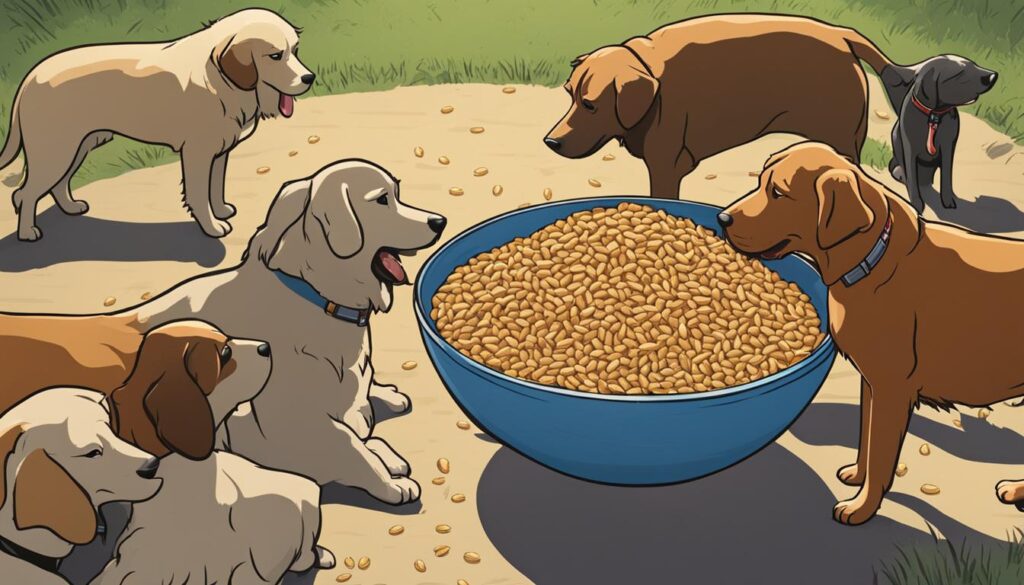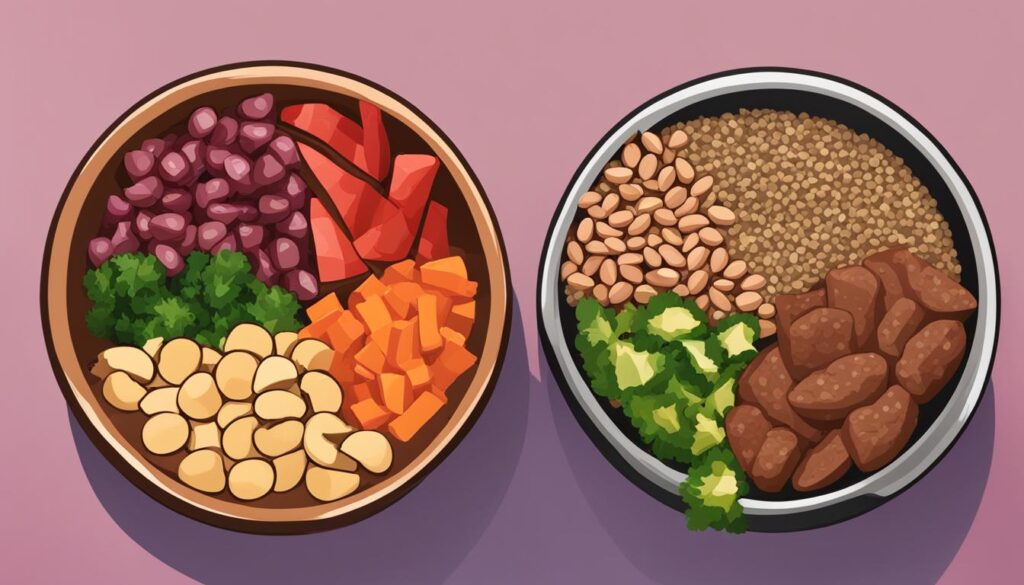Thinking about switching your furry friend to a gluten-free diet? You’re in the right place! In this article, we will explore the numerous benefits of feeding your dog gluten-free food. From improved digestion to increased energy levels, a gluten-free diet can contribute to your pet’s overall health and well-being.
But what exactly is gluten, and why should dogs avoid it? Let’s find out.
What is Gluten and Why Should Dogs Avoid It?
Gluten is a protein found in grains like wheat, barley, and rye. While dogs generally tolerate gluten well, some may have sensitivities or allergies to it. Dogs can experience symptoms such as gastrointestinal issues, skin problems, and inflammation if they are sensitive to gluten. It’s important to be aware of what ingredients are in your dog’s food to avoid any potential issues.


According to veterinarians, gluten can be difficult for dogs to digest, leading to discomfort and digestive upset. Additionally, gluten-containing grains are common allergens for dogs, and an allergic reaction to gluten can manifest as itching, redness, and inflammation of the skin. Eliminating gluten from your dog’s diet can help alleviate these symptoms.
Some dogs may also have an autoimmune condition called celiac disease, in which their bodies cannot process gluten properly. For these dogs, consuming even small amounts of gluten can cause serious health problems.
Why Should You Avoid Gluten in Your Dog’s Food?
- Reduced risk of food sensitivities: Gluten is a common allergen in dog food, and by feeding your dog a gluten-free diet, you can decrease the chances of them developing food sensitivities or allergies.
- Better digestion: Eliminating gluten from your dog’s diet can improve their digestion, as gluten can be challenging for dogs to break down and absorb.
- Improved skin health: Many dogs with gluten sensitivities experience skin problems such as itchiness and rashes. Switching to gluten-free dog food can help alleviate these issues and promote healthier skin and coat.
In conclusion, understanding what gluten is and why dogs should avoid it is vital for providing optimal nutrition and health for your furry friend. By choosing a gluten-free diet for your dog, you can reduce the risk of food sensitivities, improve digestion, and promote healthier skin and coat. Always consult with your veterinarian to determine the best dietary options for your dog’s specific needs and health conditions.
The Benefits of a Gluten-Free Diet for Dogs
Feeding your dog a gluten-free diet can have several advantages. First, it reduces the risk of food sensitivities and allergies since gluten is a common allergen in dog food. Dogs with gluten sensitivity may experience symptoms such as gastrointestinal issues, skin problems, and chronic ear infections. By eliminating gluten from their diet, you can help alleviate these symptoms and improve their overall well-being.
Second, a gluten-free diet can improve digestion in dogs. Gluten can be difficult to digest for some dogs, leading to gastrointestinal discomfort and digestive issues. By opting for gluten-free dog food, you remove this potential challenge and promote better digestion, allowing your dog to absorb nutrients more efficiently and maintain a healthier digestive system.
Additionally, a gluten-free diet can contribute to healthier skin and coat in dogs with skin issues. Gluten sensitivity can manifest as skin problems like itchiness and rashes. By eliminating gluten from their diet, you may see an improvement in their skin condition, leading to a shinier, healthier coat.
The Benefits of a Gluten-Free Diet for Dogs:
- Reduced risk of food sensitivities and allergies
- Improved digestion and nutrient absorption
- Healthier skin and coat
Overall, a balanced, high-quality gluten-free diet can contribute to your dog’s overall health and well-being. However, it’s important to note that not all dogs require a gluten-free diet. If your dog does not have any known sensitivities or allergies to gluten, a regular diet may be sufficient. Always consult with your veterinarian to determine if a gluten-free diet is the right choice for your dog based on their individual needs and health status.


Gluten-Free vs. Grain-Free Dog Food
When it comes to choosing the right food for your dog, you may come across the terms gluten-free and grain-free. While they might sound similar, there are some key differences between the two. Let’s explore the difference between gluten-free and grain-free dog food and which option may be better for your furry friend.
The Difference Between Gluten-Free and Grain-Free
Gluten-free dog food refers to food that does not contain gluten, a protein found in grains like wheat, barley, and rye. This type of dog food is suitable for dogs that have sensitivities or allergies to gluten. However, gluten-free dog food can still contain other grains like rice or corn, which do not contain gluten.
In contrast, grain-free dog food is formulated without any grains, including gluten-containing grains. Instead, it uses alternative sources of carbohydrates like potatoes or peas. Grain-free dog food is often chosen for dogs with more severe allergies or sensitivities to grains, including gluten.
Which Is Better for Dogs?
Both gluten-free and grain-free dog food can be beneficial for dogs with sensitivities or allergies. The choice between the two depends on your dog’s specific needs and sensitivities. If your dog has been diagnosed with gluten sensitivity or has exhibited symptoms like gastrointestinal issues or skin problems, a gluten-free diet may be the better option. On the other hand, if your dog has more severe grain allergies or sensitivities, a grain-free diet may be necessary.
It’s important to consult with your veterinarian to determine which option is best for your dog. They can evaluate your dog’s health and provide guidance on the most suitable dietary choice. Additionally, consider the overall nutritional balance and quality of the dog food when making your decision.
| Gluten-Free Dog Food | Grain-Free Dog Food | |
|---|---|---|
| Contains Gluten | No | No |
| Contains Grains (other than gluten) | Yes | No |
| Suitable for Dogs with Gluten Sensitivity | Yes | No |
| Suitable for Dogs with Severe Allergies or Sensitivities to Grains | No | Yes |
As always, it’s essential to monitor your dog’s reaction to the chosen diet and make adjustments if necessary. Every dog is unique, and what works for one may not work for another. By working closely with your veterinarian and choosing high-quality dog food, you can provide your furry friend with the best possible nutrition.


Signs of Gluten Sensitivity in Dogs
If you suspect that your dog may be sensitive to gluten, it’s important to be aware of the signs and symptoms to look out for. While gluten sensitivity in dogs can vary, there are some common indicators that may suggest a gluten allergy or intolerance.
Common Symptoms of Gluten Sensitivity in Dogs
- Gastrointestinal Issues: Dogs with gluten sensitivity may experience digestive problems such as vomiting, diarrhea, or constipation. These symptoms may occur consistently or intermittently.
- Skin Problems: Allergies to gluten can manifest as skin issues in dogs, including itchiness, rashes, and redness. Persistent scratching and licking of paws or other body parts can also be a sign of gluten sensitivity.
- Chronic Ear Infections: Dogs with gluten allergies may be more susceptible to chronic ear infections. If your dog frequently suffers from ear infections that do not respond to treatment, gluten sensitivity could be a possible cause.
- Behavioral Changes: Gluten intolerance can affect dogs’ behavior, leading to lethargy, depression, or changes in mood. If your dog suddenly becomes less active or shows unusual behavioral patterns, it’s worth considering gluten sensitivity as a potential factor.
- Joint Pain and Inflammation: In some cases, gluten sensitivity can contribute to joint pain and inflammation in dogs. If your dog exhibits signs of discomfort or stiffness in their joints, it may be related to their diet.
If your dog is displaying any of these symptoms, it’s recommended to consult with your veterinarian. They can help determine whether gluten sensitivity is the cause or if there may be other underlying health issues. Keeping a detailed record of your dog’s symptoms and diet can also assist your vet in making an accurate diagnosis.
Remember, every dog is unique, and while gluten sensitivity is a possibility, it may not be the cause of your dog’s symptoms. Your vet will guide you in finding the best approach to managing your dog’s health and dietary needs.


Health Conditions That May Require a Gluten-Free Diet for Dogs
While most dogs can tolerate gluten without any issues, there are certain health conditions that may necessitate a gluten-free diet. Here are some of the health conditions that may require a gluten-free diet for dogs:
Celiac Disease
Similar to humans, dogs can also suffer from celiac disease, an autoimmune disorder that affects the small intestine. Dogs with celiac disease have an adverse reaction to gluten, leading to inflammation and damage to the intestine. A gluten-free diet is essential for managing celiac disease in dogs and alleviating symptoms such as diarrhea, vomiting, and weight loss.
Food Sensitivities and Allergies
Dogs can develop sensitivities or allergies to certain food ingredients, including gluten. If your dog experiences gastrointestinal issues, skin problems, or excessive itching after consuming gluten-containing foods, a gluten-free diet may be necessary to alleviate their symptoms and improve their overall well-being.
Inflammatory Bowel Disease (IBD)
Inflammatory bowel disease is a chronic condition characterized by inflammation in the digestive tract. While the exact cause of IBD is unknown, dietary factors, including gluten, can contribute to flare-ups and worsen symptoms. A gluten-free diet, along with other treatment options recommended by your veterinarian, can help manage IBD and reduce gastrointestinal inflammation in affected dogs.
Autoimmune Disorders
Some autoimmune disorders, such as autoimmune thyroiditis and immune-mediated polyarthritis, may benefit from a gluten-free diet. Gluten can trigger an immune response in dogs with these conditions, leading to increased inflammation and discomfort. By eliminating gluten from their diet, you may help reduce inflammation and manage their symptoms more effectively.
It’s important to note that if you suspect your dog has any of these health conditions, it’s crucial to consult with your veterinarian before making any dietary changes. They can provide guidance on whether a gluten-free diet is suitable for your dog’s specific needs and recommend the best course of action to improve their health and well-being.


Choosing the Best Gluten-Free Dog Food
When it comes to choosing the best gluten-free dog food for your furry friend, there are a few important factors to consider. By selecting a high-quality and nutritionally balanced option, you can ensure that your dog receives the necessary nutrients without any potential gluten-related issues. Here are some tips to help you make the right choice:
1. Read the Ingredients
Take the time to carefully read the ingredient list on the dog food packaging. Look for gluten-free options that use whole-food ingredients and avoid artificial additives. Ingredients like lean meats, fruits, vegetables, and gluten-free grains such as rice or quinoa can provide the necessary nutrients for your dog’s health.
2. Consider Your Dog’s Specific Needs
Every dog is different, so it’s important to consider your dog’s specific needs when choosing a gluten-free dog food. If your dog has any existing health conditions or food sensitivities, consult with your veterinarian to ensure you select a dog food that addresses those needs. Some options may be tailored for dogs with allergies, sensitive stomachs, or other specific dietary requirements.
3. Research the Brand
Choose a reputable brand with a history of producing safe and nutritious dog food. Look for brands that prioritize quality control, sourcing ingredients from trusted suppliers. Online reviews and testimonials from other dog owners can also provide valuable insights into the brand’s reputation and the overall satisfaction of their customers.
By following these tips and selecting the best gluten-free dog food for your pet, you can support their overall health and well-being. Remember to consult with your veterinarian to determine the most suitable option for your dog’s individual needs. Giving your dog a nutritionally balanced diet tailored to their specific requirements can help ensure a happy and healthy life.


“Choosing the right gluten-free dog food is essential for your pet’s health. By selecting high-quality ingredients and considering your dog’s specific needs, you can provide them with a well-balanced and nutritious diet. Always remember to consult with your veterinarian for expert advice and recommendations.”
Conclusion
So, there you have it! Feeding your furry companion a gluten-free diet can bring about a host of benefits. From improving digestion to reducing the risk of food sensitivities, a gluten-free dog food can have a positive impact on your pet’s overall health.
By opting for a gluten-free diet, you can help your dog enjoy increased energy levels and maintain optimal health. Moreover, a gluten-free diet can help dogs with skin issues by promoting healthier skin and coat. It’s undoubtedly a great way to show your four-legged friend some love and care.
However, it’s crucial to remember that every dog is unique, and consulting with your veterinarian is of utmost importance. They can guide you in determining if a gluten-free diet is suitable for your dog’s individual needs and health condition. Additionally, selecting a high-quality gluten-free dog food from a reputable brand will ensure that your pet receives the necessary nutrition for their well-being.
FAQ
What are the benefits of feeding my dog gluten-free food?
Feeding your dog gluten-free food can lead to improved digestion, increased energy levels, and overall better health. It also reduces the risk of food sensitivities and allergies, promotes healthier skin and coat, and can be beneficial for dogs with certain health conditions.
What is gluten, and why should dogs avoid it?
Gluten is a protein found in grains like wheat, barley, and rye. While most dogs tolerate gluten well, some may have sensitivities or allergies to it. Dogs with gluten sensitivity can experience symptoms such as gastrointestinal issues and skin problems. Avoiding gluten can help alleviate these symptoms.
What is the difference between gluten-free and grain-free dog food?
Gluten-free dog food refers to the absence of gluten in the food, but it can still contain other grains like rice and corn. Grain-free dog food, on the other hand, does not contain any grains, including gluten-containing grains. Both options can be beneficial for dogs with sensitivities or allergies, but it’s important to choose the right option based on your dog’s specific needs.
What are the signs of gluten sensitivity in dogs?
Dogs with gluten sensitivity may exhibit symptoms such as gastrointestinal issues, skin problems, chronic ear infections, behavioral changes, and joint pain and inflammation. If you suspect your dog has a gluten allergy or sensitivity, it’s important to consult with your vet and potentially consider eliminating gluten from their diet.
What health conditions may require a gluten-free diet for dogs?
Some health conditions in dogs that may require a gluten-free diet include celiac disease, food sensitivities and allergies, inflammatory bowel disease (IBD), and certain autoimmune disorders. A gluten-free diet can help manage symptoms and improve the overall health of dogs with these conditions.
How do I choose the best gluten-free dog food?
When selecting gluten-free dog food, it’s important to consider the ingredients, nutritional balance, and brand reputation. Look for high-quality, whole-food ingredients without artificial additives. Ensure that the dog food provides a balanced and complete nutritional profile. Choose a reputable brand with a history of producing safe and nutritious dog food.

